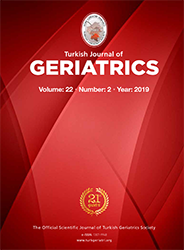Materials and Method: Participants included 163 bereaved people living in nursing homes (mean age=78.73±7.07, min-max=65?96). They completed the Socio-demographic Information Form and five self-report scales. Independent samples t-test and multivariate analyses of variance were performed to examine whether post-traumatic growth varies according to gender. Further, hierarchical regression analysis was conducted to determine the growth predictors.
Results: Results showed that widows reported a significantly higher level of growth, and being a woman predicted total growth and two subdimensions thereof. While negative religious coping predicted only total growth, positive religious coping predicted total growth and two subdimensions. Furthermore, perceived social support from friends predicted only total growth and that from significant others predicted total growth and two subdimensions. Self-esteem was not a growth predictor.
Conclusion: Because social support and coping strategies are related to post-traumatic growth, interventions focused on social support resources and coping process may be beneficial in facilitating growth in bereaved people. Moreover, supporting the elderly with basic everyday life skills will be functional in terms of preventive health policies.
Keywords : Aged; Widowhood; Posttraumatic growth, Psychological; Self-esteem; Social support
